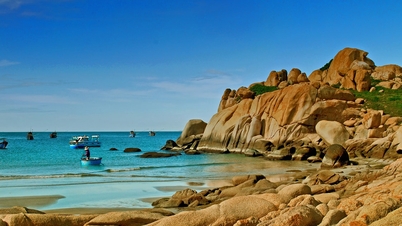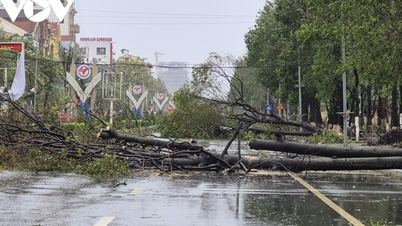German Chancellor Friedrich Merz speaks at the Summer press conference in Berlin on July 18, 2025. (Photo: THX/TTXVN)
One of the latest shock moves was the decision to immediately stop supplying arms to Israel, over concerns that they could be used in fighting in the Gaza Strip.
The decision was made without prior discussion within the center-right Christian Democratic Union (CDU), and even the Bavarian coalition party, the Christian Social Union (CSU), was not informed.
His tenure did not start smoothly. On May 6, when the Bundestag met to elect a new chancellor following the February 23 general election, it took an unprecedented second round of voting for Merz to secure the necessary number of votes to become head of government.
From the very beginning, the new government showed strong political maneuvering. Before officially taking office, Mr. Merz's governing coalition and the Green Party (then in opposition) won a two-thirds majority in the Federal Parliament to abolish strict regulations on public borrowing - a move that broke the commitment to protect the "debt brake" that was clearly enshrined in the German Constitution.
This paves the way for a massive 500 billion euro budget to strengthen the armed forces and at least another 500 billion euro for transport infrastructure, schools and climate initiatives – a figure that even international organizations such as the Organisation for Economic Co-operation and Development (OECD), the International Monetary Fund (IMF) and the European Commission have long recommended Germany invest.
In foreign affairs, Prime Minister Merz quickly showed an active role. Just a few days after his election, he traveled to Kiev with French President Emmanuel Macron and British Prime Minister Keir Starmer, reaffirming Europe's solidarity with Ukraine.
German Chancellor Friedrich Merz (left) during a meeting with French President Emmanuel Macron in Paris, May 7, 2025. (Photo: Reuters/TTXVN)
In early June, he visited the White House and received a warm welcome from US President Donald Trump. Prime Minister Merz also showed confidence at the European Union (EU) and North Atlantic Treaty Organization (NATO) summits.
On the border security front, the government has taken measures to curb illegal immigration. Interior Minister Alexander Dobrindt has increased border controls, including turning away asylum seekers – a controversial move that is seen as a breach of EU law.
Despite triggering a reaction from Poland with countermeasures, Mr. Dobrindt affirmed the need to prevent human trafficking crimes and establish legal immigration pathways.
Along with the groundbreaking decisions, the government of Prime Minister Merz also quickly ran into problems that undermined its credibility. During the election campaign, Mr. Merz had affirmed that he would protect the “debt brake” and prioritize national financial stability, but in reality, it was one of the first policies to be reversed.
The election promise of reducing electricity prices for all people was broken, when the government only applied electricity tax reduction to the industrial, agricultural and forestry sectors, citing budget constraints.
Within the coalition, the appointment of a judge to the Federal Constitutional Court has become the first political crisis. The Social Democratic Party (SPD) candidate, Frauke Brosius-Gersdorf, despite being approved by a bipartisan committee, was still refused support by some conservative MPs.
On the day of the vote, plagiarism allegations unexpectedly surfaced, causing the confirmation process to be canceled. The candidate then withdrew, leaving a vacancy that lasted beyond the summer break.
The political situation is also not favorable. Chancellor Merz's government was formed after the coalition of the center-left SPD, the environmentalist Green Party and the neo-liberal Free Democrats (FDP) collapsed over budget disputes, paving the way for the far-right Alternative for Germany (AfD) to increase its support rate to 20.8%.
Despite his initiative, Mr. Merz’s leadership image has not inspired public confidence. In a Forsa poll, the AfD leads the CDU/CSU in support, 26% to 24%. A poll by the ARD television station showed that only 28% of people are satisfied with the government, with only 26% trusting Chancellor Merz’s leadership style.
Analysts say Prime Minister Merz's first 100 days show a decisive leadership style, unafraid to make sudden changes and even break precedent.
However, a lack of internal consensus and a reversal of campaign pledges threatens to damage long-term credibility. German public opinion is divided: some praise the new government's speed and firmness, while others worry about its instability and tendency to concentrate power in the Chancellor's own hands.
Atlantic Council experts say Chancellor Merz has reshaped Germany's global role, focusing on security and the EU, but institutional weakness and delays in Ukraine relief have damaged its reputation.
Meanwhile, the Financial Times highlighted the diplomatic style of the “Außenkanzler” (Foreign Chancellor), placing Germany at the center of European security, rejecting the Nord Stream 2 project and increasing defense spending.
German Chancellor Friedrich Merz speaks at a press conference in Berlin. (Photo: THX/TTXVN)
When Mr. Merz took office, analysts pointed out four challenges he faced.
First of all, it is necessary to strengthen trust in a country obsessed with the future, because since 2020, the satisfaction rate of Germans with the ability of their leaders to overcome the crisis has dropped from 63% to only 23%.
The second is to re-energize the economy as 2025 is forecast to be the third consecutive year of no growth, something not seen since the founding of the Federal Republic of Germany in 1949.
Third, stop the advance of the far-right AfD party, but to do that, we must effectively address the problem of illegal immigration.
Finally, strengthen the military to reduce dependence on the US. After 100 days, it seems all four challenges remain.
The coming months will be the real test, as huge investment plans need to be translated into concrete results, reforms must overcome legal obstacles and gain support in Parliament, and the government must prove that it can not only create surprises, but also bring sustainable results for Germany./.
According to VNA
Source: https://baothanhhoa.vn/dau-an-va-chalch-thuc-doi-voi-thu-tuong-duc-friedrich-merz-sau-100-ngay-nham-chuc-257982.htm






![[Photo] Hanoi morning of October 1: Prolonged flooding, people wade to work](https://vphoto.vietnam.vn/thumb/1200x675/vietnam/resource/IMAGE/2025/10/1/189be28938e3493fa26b2938efa2059e)





































![[Photo] The 1st Congress of Phu Tho Provincial Party Committee, term 2025-2030](https://vphoto.vietnam.vn/thumb/1200x675/vietnam/resource/IMAGE/2025/9/30/1507da06216649bba8a1ce6251816820)
![[Photo] President Luong Cuong receives President of the Cuban National Assembly Esteban Lazo Hernandez](https://vphoto.vietnam.vn/thumb/1200x675/vietnam/resource/IMAGE/2025/9/30/4d38932911c24f6ea1936252bd5427fa)
![[Photo] Panorama of the cable-stayed bridge, the final bottleneck of the Ben Luc-Long Thanh expressway](https://vphoto.vietnam.vn/thumb/1200x675/vietnam/resource/IMAGE/2025/9/30/391fdf21025541d6b2f092e49a17243f)


























































Comment (0)